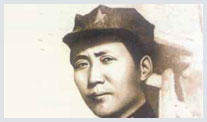|
| Changing China: WTO membership shakes up the economy
|
| 2002-10-09 15:24:05 |
China's decision to join the WTO marked an important step forward in becoming one of the world's leading economies. Even though the process heralds some painful domestic changes, the country is determined to play its part in the international trade arena.
In northeast China's Jilin Province, farmers have grown corn on this fertile land. But they are facing a daunting challenge to their livelihood -- cheaper corn from other countries.
Zhang Cai, a farmer in Jilin, says, "I will continue to grow corn if the prices go up. If not, I will have to grow other crops."
Chinese farmers are among the hardest hit by the country's moves to fulfill its commitments to free trade. Many farm workers will have to make the switch to other sectors of the economy, while many poorly managed, state-owned enterprises will be edged out of business. While some are feeling the pain of changes in the transition's initial stages, most Chinese agree that WTO membership presents more opportunities than challenges in the long run.
Wu Yi, the state councilor, says, "We expect to attract more than 50 billion US dollars of foreign direct investment this year, a record high in history. This will be the best reward of China's WTO membership."
The increase in foreign direct investment has been one of the most immediate benefits. But there are more positive changes that can't be seen right now. China's WTO accession is the Chinese leadership's commitment that the policy of reform and opening-up will continue and intensify. And this is key for foreign investors.
The accession process gained momentum when China adopted a full market economy and triggered an economic boom.
Charlene Barshefsky, the former US trade representative, says, "Of course, in the commercial sense, the US and other countries around the world hope to gain commercially from a more open Chinese market, a market that is more acceptive to investment from abroad, as well as to the goods and services."
For Chinese businesses, WTO means increased competitiveness and a rule-based environment. While for ordinary Chinese, it brings wider choice of commodities. For example, China has agreed to slash tariffs on imported cars by three-quarters within a five-year period, giving consumers the chance to buy a brand-name car.
The changes will inevitably cause unemployment but they may also increase job opportunities for many Chinese.
China's WTO membership is a milestone in the country's history, marking its integration with the rest of the world. In the past, China had been a nation noted for "going it alone," rather than participating in world markets. But with China joining the international community, the WTO will never be the same, and neither will China's economy.
|
|










